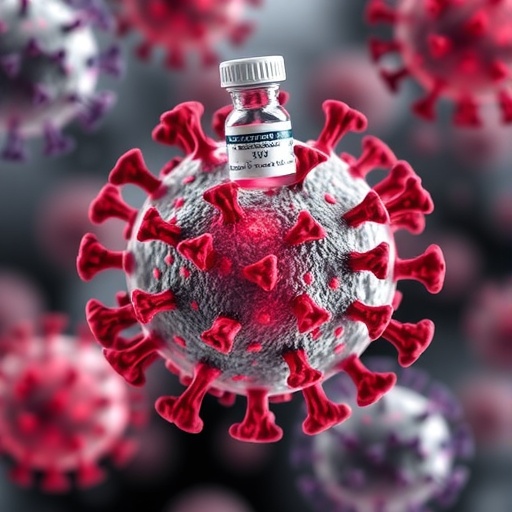In a groundbreaking discovery that reshapes the landscape of cancer immunotherapy, researchers from the University of Florida and the University of Texas MD Anderson Cancer Center have found that patients with advanced lung or skin cancer who received a COVID-19 mRNA vaccine within 100 days of starting immune checkpoint inhibitor therapy experienced significantly prolonged survival. This observation signals a potentially transformative synergy between mRNA vaccination and cancer immunotherapy, hinting at the future development of a universal cancer vaccine grounded in mRNA technology.
This revelation builds upon over a decade of rigorous research aiming to harness mRNA therapeutics’ ability to stimulate the immune system to combat malignancies. The COVID-19 mRNA vaccines, initially designed to teach the immune system to recognize and respond to the SARS-CoV-2 spike protein, may have an unexpected broader impact. The study analyzed comprehensive patient records and found that the mRNA vaccine could “wake up” and sensitize tumors to immunotherapy, greatly enhancing antitumor immune responses and extending patient survival times compared to immunotherapy alone.
Data analysis encompassed over 1,000 patients treated at MD Anderson from 2019 to 2023, focusing on individuals with stage 3 and 4 non-small cell lung cancer as well as metastatic melanoma. Among these, patients receiving the COVID-19 mRNA vaccine soon before or after initiating immunotherapy had nearly double the median survival in lung cancer—from 20.6 months to 37.3 months—and a considerable extension in survival among melanoma patients, underscoring the vaccine’s potential as a powerful adjunct to existing treatments.
At the core of this discovery lies the mechanism of immune checkpoint blockade, wherein therapeutic agents release the natural “brakes” on T cells, enabling a more vigorous attack on cancer cells. Historically, many patients show limited responses to these therapies. However, the introduction of an mRNA vaccine appears to act as an immune system primer, inflaming immunologically “cold” tumors and mobilizing immune cells from tumorous environments to lymph nodes, facilitating a robust antitumor response.
Dr. Elias Sayour, a pediatric oncologist at UF and co-senior author of the study, has extensively investigated mRNA vaccines from a nontraditional angle. His past work demonstrated that a so-called “nonspecific” mRNA vaccine, not targeting any specific tumor antigens but based on mRNA technology, could generate potent antitumor immunity in preclinical models. This concept challenged the longstanding paradigm that vaccines must target particular tumor markers, instead leveraging the immune system’s virus-fighting machinery to attack cancers broadly.
To probe whether the widely administered COVID-19 mRNA vaccines might exert similar off-target immunomodulatory effects, the research team assessed clinical outcomes of patients receiving these vaccines in proximity to immune checkpoint therapy initiation. Complementing clinical data, murine studies using COVID spike-targeted mRNA vaccines combined with checkpoint inhibitors demonstrated that previously resistant tumors could be rendered susceptible, suppressing tumor growth and substantially improving survival.
The implications of this work are profound. Not only could existing COVID-19 mRNA vaccines inadvertently confer therapeutic benefits for cancer patients undergoing immunotherapy, but it also opens the door for engineered “universal” mRNA vaccines designed explicitly to prime and enhance immune responses against various cancers. Such vaccines would be “off-the-shelf,” broadly applicable across cancer types, and could be rapidly deployed, revolutionizing standard oncological care.
While the evidence is compelling, the authors caution that the findings remain observational and urge rigorous randomized clinical trials to validate efficacy and causality. Plans are underway to initiate such a trial through the OneFlorida+ Clinical Research Network, which spans multiple states and healthcare institutions, setting a path toward translating these discoveries from academic settings into widespread clinical practice.
Experts in the field have hailed the study as a striking example of how mRNA technology, propelled into the spotlight by the COVID-19 pandemic, continues to reveal unforeseen benefits beyond infectious disease prevention. Dr. Jeff Coller of Johns Hopkins University remarked that this study exemplifies how innovative mRNA medicines are revolutionizing cancer treatment, a field long in need of breakthroughs.
In advanced cancers, where therapeutic options are often exhausted and prognoses grim, the possibility of extending survival by leveraging the immune system’s innate defenses via mRNA vaccines is a beacon of hope. A universal cancer vaccine that synergizes seamlessly with immunotherapy could represent a paradigm shift, transforming cancer from a terminal diagnosis to a manageable chronic disease or even achieving long-term remission.
Additionally, the study found no survival benefit from non-mRNA vaccines such as flu or pneumonia vaccines, underscoring the unique immunological properties of mRNA platforms. This specificity hints at the distinctive molecular and cellular pathways engaged by mRNA vaccines, which may effectively recalibrate the immune milieu surrounding tumors to overcome resistance barriers.
The successful application of mRNA vaccines in oncology is the culmination of technological advances in lipid nanoparticle delivery systems and a deeper understanding of mRNA biology. These innovations enable the precise delivery and sustained expression of therapeutic proteins or immunostimulatory signals, energizing immune cells without triggering deleterious inflammation.
Future directions involve optimizing the design of nonspecific mRNA vaccines to amplify their efficacy and safety profiles. Researchers envision vaccines that rally a broad army of immune effectors, including dendritic cells and cytotoxic T lymphocytes, thereby enhancing tumor antigen presentation and immune memory formation, critical components for durable cancer control.
With extensive patent portfolios related to UF-developed mRNA vaccines licensed to biotechnology enterprises, the translation of this research into commercially viable therapies is actively progressing. These collaborative efforts between academia and industry aim to rapidly bring next-generation cancer vaccines to the clinic, fundamentally altering therapeutic paradigms.
Ultimately, this discovery underscores the untapped potential of mRNA vaccine technology far beyond infectious diseases, heralding a new era where immunotherapy and vaccination converge to offer cancer patients renewed hope and improved survival outcomes.
Subject of Research: People
Article Title: SARS-CoV-2 mRNA vaccines sensitize tumours to immune checkpoint blockade
News Publication Date: 22-Oct-2025
Web References:
https://dx.doi.org/10.1038/s41586-025-09655-y
References:
Sayour, E.J., Grippin, A., and Mitchell, D.A. “SARS-CoV-2 mRNA vaccines sensitize tumours to immune checkpoint blockade.” Nature, 2025.
Image Credits: UF Health/Jackie Hart
Keywords: Cancer, Lung cancer, Skin cancer, Cancer treatments, COVID-19, SARS CoV-2, COVID-19 vaccines, Vaccine research




